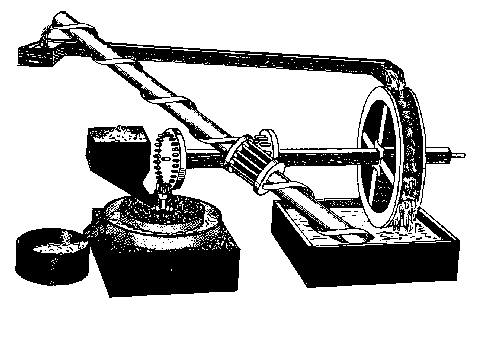Brought to you by Peet's Costa Rica blend...
Mankind has always been fascinated by the concept of the perpetual motion machine. A gizmo that will keep running forever without additional energy inputs, that relies on its own internal feedback loops to supply the forces needed to keep it going. Alas, such contraptions always seem to run afoul of the basic laws of thermodynamics. Someday even our Sun is going to flame out, expanding out to engulf Earth and ending everything we know, even Dancing With The Stars. And this particular solar system will be no more, and unless we first establish contact with an alien civilization with better survival prospects than our own, there will be no history, anywhere, that we ever even existed.
So how serious, really, can any problem actually be?
Still, it pains me to see economists and other learned charlatans struggle with this concept of the national debt and fiscal deficits. It takes up so much time, and in this day of digitally manufactured money, it just seems silly. So I wanted to come up with a way, working within existing laws and the basic framework of Federal Reserve finance, to solve this problem once and for all. And I think I've got it.
I was writing last time out about the ways in which the American money supply has become a thoroughly confused admixture of both "traditional" (debt-based) money and the increasing component of cash which the Federal Reserve and Treasury pull out of their collective ass. This is one of the advantages of having a very complicated government with a byzantine financial structure, with lots of very serious men and women in dark clothing harrumphing on about "quantitative easing" and "Large Scale Asset Purchases" and "increasing the monetary base" and all the rest of this nonsense. In the midst of such confusion, it's easy to slip in little money-making tricks like having a pile of IOU's (the Social Security Trust Fund) which essentially say, "The United States Promises To Pay the United States $2.5 Trillion," actually produce money which gets "added" back into the federal budget. Or having the Treasury issue bonds to Primary Dealers (the Kool Kids on Wall Street) which the Federal Reserve "buys" with billions blown out its bunghole, and then the Treasury is "obligated" to the Federal Reserve, except that the Federal Reserve just uses the "interest" earned on the money it made up out of thin air to pay its expenses and remits the balance to the Treasury. Thus, the larger the obligation of the Treasury to the Federal Reserve, the more money the Treasury can earn on its debts.
It was this latter realization which caused the light bulb to go on over my head. Why are we fooling around here with half-measures when the solution is at hand? I want to reiterate that it is actually adult human beings who are playing the games sketched out above. They do these silly things while cloaking the whole malarkey in lots of learned discourse and serious verbiage designed to make you think that cowpies are chocolate danish. So I say, let's just get the whole ridiculous thing over with. As follows:
The Treasury holds the Final Auction. At this auction, it will sell Treasury obligations to the Primary Dealers in the total amount of $100 trillion, paying a 5% coupon over 100 years. The Primary Dealers agree to borrow the money they need to fully fund the auction from the Federal Reserve at the current fed rate of .01%. The Federal Reserve, acting as any prudent banker, takes as collateral the future expectancy of the bonds themselves, a dodge made necessary by the current, laughable rule that the Federal Reserve cannot bid directly at a Treasury auction (it has to wait, like, a day until the Primary Dealers take down half an auction). The Primary Dealers buy the Treasuries, they immediately sell them to the Federal Reserve (the Federal Reserve hitting the keyboard to come up with the hundred tril), and now the Treasury Department owes the Federal Reserve $100 trillion, at a 5% coupon. After deducting the Federal Reserve's insignificant expenses, this allows the Treasury to earn $5 trillion per year on the debt which the Treasury owes to the Treasury (I'm just leaving out the silliness of pretending the Fed is anything other than a proxy for the Treasury in this scheme).
The federal government is fully funded without taxation or further bond sales. Indeed, the Treasury has about $1 trillion surplus, which can be doled out to every man, woman and child in the United States, on a per capita basis. A nice little stipend for everybody. There is no need for inflation, and barely any need for employment.
It's simply a matter of Thinking Big and going for it.



No comments:
Post a Comment